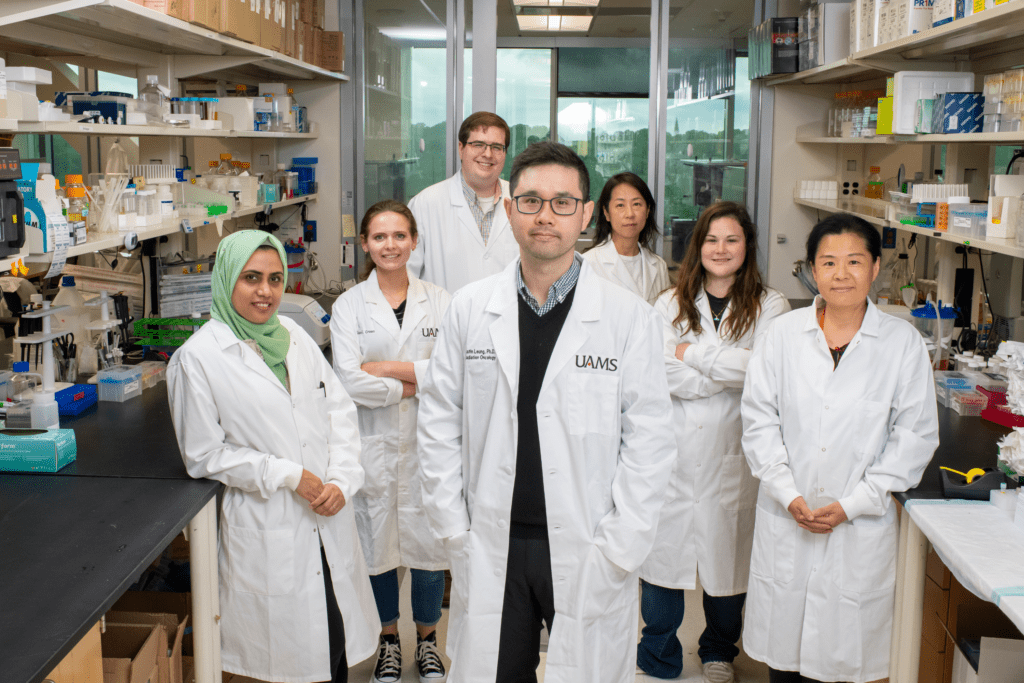
Members of the Leung Lab at the Winthrop P. Rockefeller Cancer Institute include scientists (l to r): Farhana Nasrin, Claire Greene, Kirk West Ph.D., Justin Leung Ph.D., Seong-ok Lee, Jessica Kelliher and Yu Chen.
When DNA is damaged, the human body has a built-in repair shop known as the DNA damage response pathway that maintains the integrity of our genetic material.
“DNA is damaged millions of times a day, either from internal or external sources. The DNA damage response pathway is the body’s natural process of maintaining genome stability,” said Justin Leung, Ph.D., assistant professor and director for Translational Research in the UAMS Department of Radiation Oncology.
A prominent member of the Winthrop P. Rockefeller Cancer Institute, Leung leads one of the institute’s most promising research teams focused on learning more about the DNA repair process in cancer.
In cancer patients, DNA mutates and becomes defective, essentially dysregulating the repair process. Leung believes the study of this defective DNA and its molecular environment can uncover new therapeutic targets that attack cancer cells in the DNA damage and response pathway.
“In a normal cell, DNA will repair just fine, but if it mutates, it won’t
be able to do its job,” said Leung.
“The more DNA breaks, the more vulnerable it becomes and more sensitive to radiation. If we target the DNA damage response pathway in cancer cells, they are more likely to die and die quickly. With the right radiation dose, mutated cells should be highly responsive to treatment.”
Funded by more than $5 million in research grants, Leung and his team are undertaking a comprehensive study of the molecular mechanisms of genome stability and the translational aspects of targeting the DNA damage response pathway as a therapeutic strategy.
“My team’s expertise lies in an integrated workflow of molecular biology, gene editing, cell-based assays, biochemical assays, proteomics, live-cell microscopy and data analysis. They are the pillars of the science and the magic happens in the lab.” Leung said
Similar to the BRCA 1 gene discovery in breast cancer, Leung hopes to identify new DNA repair genes involved in cancer development. Both breast and ovarian cancers are well characterized for DNA repair pathway deficiency.
“Translationally, if we identify new genes that are druggable, we can translate that to the clinic with good therapeutic interventions in the future,” Leung said.
By broadening his research to the entire molecular environment in which DNA repair takes place, Leung hopes to identify specific molecules that can target DNA repair genes and proteins and sensitize cancer cells to radiation.
“We are just beginning to understand what molecules control damaged DNA in most cancers,” said Leung. “We hope our findings contribute to a better understanding of DNA repair in cancer and new approaches to treatment.”
A native of Hong Kong, Leung came to cancer research by chance. He was studying diabetes and stroke for his Ph.D. at the University of Hong Kong when a Yale scientist, who later became his first postdoctoral mentor, inspired him to pursue cancer research. Leung received his comprehensive postdoctoral training at Yale, M.D. Anderson Cancer Center and the University of Texas at Austin.
Ready to focus on his own research interests, Leung joined UAMS in 2018 with the National Cancer Institute’s (NCI) Transition Career Development Award. In four years, his lab has received six extramural awards from NCI, the National Institute of General Medical Sciences (NIGMS) and the American Cancer Society (ACS). He is the first early stage investigator to receive NIGMS’s R35 Maximizing Investigators’ Research Award and the only current ACS Research Scholar in Arkansas.
Including a postdoctoral fellowship awarded to Kirk West, Ph.D., Leung and his team have three active ACS grants for different projects. Leung is a two-time recipient of the Arkansas Breast Cancer Research Program research grant.
Recently, Leung received the highly competitive TheoryLab Collaborative (TLC) grant from ACS, eligible only to ACS research scholars. The TLC award exclusively funds innovative and high-impact ideas for cancer research and will go toward a new collaboration with Wenqi Wang, Ph.D., at the University of California, Irvine to study the role of the Hippo pathway in DNA repair.
In all, Leung’s laboratory studies:
- Chromatin biology
- Histone functions
- Molecular genetics
- Epigenetics
- Cancer evolution
- Therapeutic resistance
- Radiation response
